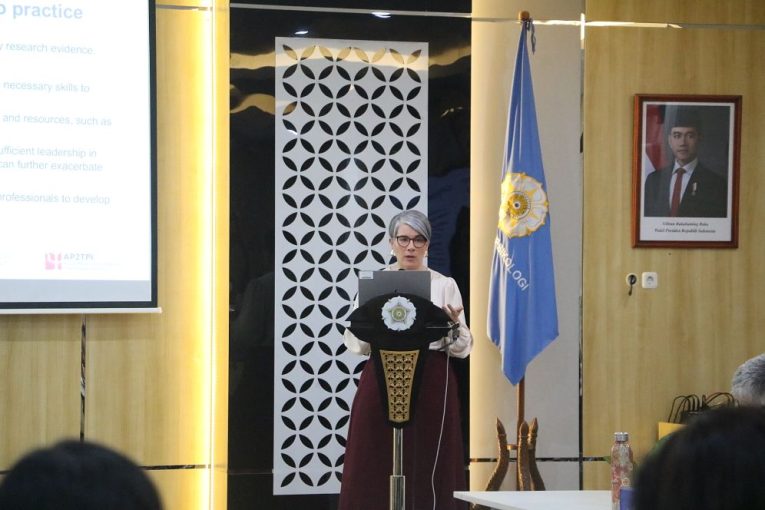
The Faculty of Psychology at Universitas Gadjah Mada (UGM) hosted three major events aimed at strengthening evidence-based psychology practices in Indonesia. Organized by the Association of Indonesian Higher Education Providers in Psychology (AP2TPI) and supported by the Joanna Briggs Institute (JBI), these events took place from July 28–31, 2025.
The three agendas included the Regional Workshop, Comprehensive Systematic Review Training, and the AP2TPI Board of Directors’ Working Meeting. Altogether, these activities served as a strategic step toward realizing stronger, standardized professional psychological practices.
The first agenda, the Regional Workshop: Evidence-Based Psychological Practice, was held on Monday (07/28) in room A-203. Serving as the opening event, it involved representatives from the Indonesian Psychological Association (HIMPSI). The workshop focused on aligning perspectives and formulating an action plan for developing evidence-based psychological services in Indonesia.
“This meeting is a space for reflection. We want to build an Indonesian psychology system that is evidence-based and relevant to our context. It is time to ask: what is the evidence, and for whom is this evidence created?” said Prof. Dr. Bagus Takwin, M.Hum., Psychologist, a HIMPSI member from Universitas Indonesia, in his remarks.
In the introductory session, Bianca Pilla, Prof. Deborah Turnbull, and Dr. Chevaun Haseldine presented Evidence-Based Practice (EBP) as a key approach at the University of Adelaide. They emphasized that EBP integrates scientific evidence, clinical expertise, and client values and needs. The introduction to EBP was followed by presentations from Prof. Deborah Turnbull, Dr. Sonia Hines, and Bianca Pilla, who discussed the implications of EBP in psychological, nursing, and healthcare practices. Furthermore, Dr. Natasha van Antwerpen elaborated on the structure of the psychology profession in Australia, including the roles of institutions such as the Australian Psychological Society (APS), the Australian Psychology Accreditation Council (APAC), and the Australian Health Practitioner Regulation Agency (AHPRA).
The next session addressed the challenges and opportunities for evidence-based psychology in Indonesia. Presentations were delivered by the Dean of the UGM Faculty of Psychology and AP2TPI Chair, Rahmat Hidayat, S.Psi., M.Sc., Ph.D., the Chair of HIMPSI, Dr. Andik Matulessy, M.Si., Psychologist, mental health policy reform advocate and psychologist Alissa Qotrunnada Munawaroh Wahid, and the Director and founder of Bina Insan Mandiri Psychology Bureau, Iffah Rosyiana, S.Psi., M.Psi., Psychologist.
The workshop concluded with group discussions and presentations on practical strategies to overcome barriers and leverage opportunities for implementing EBP in Indonesia’s context. Each group formulated an action plan based on identifying the environment, key challenges, internal strengths, and accessible opportunities, including potential funding and cross-institutional collaboration. This activity became both a moment of reflection and an initial step in building a collective commitment to integrating evidence-based practices into psychological policies and services in Indonesia.
Writer: Relung Fajar Sukmawati
Editor: Erna Tri Nofiyana
Photo: Fadia Hayu Godwina
